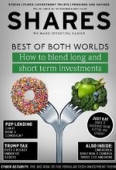Archived article
Please note that tax, investment, pension and ISA rules can change and the information and any views contained in this article may now be inaccurate.
Brexit deal on… then off again

Sterling is enduring considerable volatility as the UK Government desperately tries to get closer to meeting the conditions required to begin trade talks with the European Union (EU).
The pound surged on 4 December amid speculation a divorce settlement was about to be delivered but opposition from the Democratic Unionist Party (DUP) to a settlement of the Irish border issue put paid to any deal.
Now the race is on to secure a compromise ahead of a crunch Euro Summit on 14 and 15 December. With all 27 EU countries participating this is a critical opportunity to secure the transition deal which can deliver the level of certainty and visibility craved by business.
Three key issues need to be resolved; while progress has been made on citizens’ rights and the Brexit bill, the sticking point is avoiding a hard border between Northern Ireland and the Republic of Ireland.
The DUP sees wording on ‘regulatory alignment’ between the countries as incompatible with leaving the EU on the same terms as the rest of the UK.
There appear two likely scenarios at this stage:
An agreement is reached ahead of the summit:
This would likely see the pound surge higher still. It could put pressure on stocks with big overseas earnings (and hence the FTSE 100 index) and exporters but would likely be a net positive for the market given the implied greater certainty on European trade.
No agreement is reached ahead of the summit:
Sterling could slump as market traders price in the increased likelihood of a ‘hard Brexit’ without any trade deal.
This would likely boost export-led plays and firms with plenty of international business but domestic-facing firms and companies deriving substantial revenue from the European Union would be hard hit.
Shares in housebuilders, banks and retailers could struggle. (TS)
Important information:
These articles are provided by Shares magazine which is published by AJ Bell Media, a part of AJ Bell. Shares is not written by AJ Bell.
Shares is provided for your general information and use and is not a personal recommendation to invest. It is not intended to be relied upon by you in making or not making any investment decisions. The investments referred to in these articles will not be suitable for all investors. If in doubt please seek appropriate independent financial advice.
Investors acting on the information in these articles do so at their own risk and AJ Bell Media and its staff do not accept liability for losses suffered by investors as a result of their investment decisions.
 magazine
magazine








